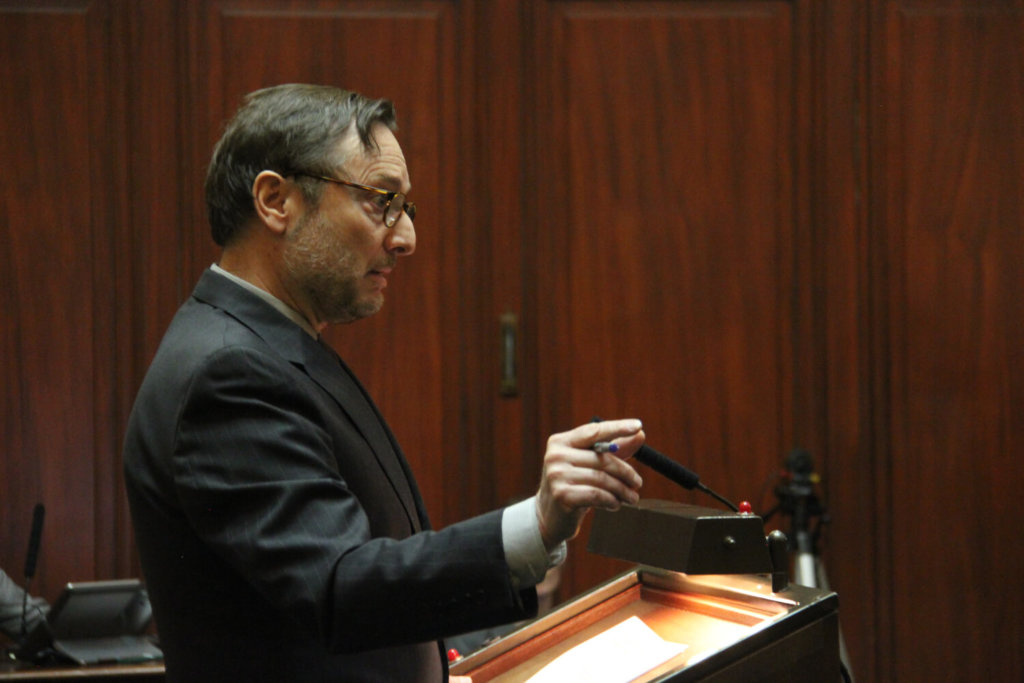Opinion: Defense in Vermont Supreme Court against the “fracked gas” pipeline

In 2016 Vermont Gas Systems, Inc. continued to lay a controversial 41-mile natural gas pipeline through Chittenden and Addison counties as citizen opponents filed an appeal in the Vermont Supreme Court to stop one leg of the “fracked gas” project from tunneling through Geprags Park in Hinesburg.
My husband, Louis Cox, and I listened to oral arguments before the Supreme Court in Montpelier on April 4, as we sat in solidarity with our neighbors from Charlotte, Hinesburg and other Vermont communities who have tirelessly resisted the project for the past couple of years.
It was exciting to observe firsthand how our justice system functions, as the justices listened to about 30 minutes of oral arguments from attorneys representing citizens of Hinesburg and attorneys representing Gaz Metro, headquartered in Quebec, Canada, the parent company of Vermont Gas Systems (VGS). The justices had already received written briefs, and this was the opportunity for the attorneys to highlight key points in their cases and for the justices to ask questions.
The project had been given the overall approval last year by the Vermont Public Service Board (PSB). In doing so, the PSB was not deterred by numerous objections that had been raised about the project’s major cost overruns, which will affect rate payers, marginal benefits for those who will be most affected by the project, the legality of a foreign-owned corporation condemning land in the U.S. for a utility right-of-way, and assertions that any new fossil-fuel infrastructure would undermine efforts to transition to a sustainable, renewable-energy future.
One of the major arguments against the pipeline going through Geprags Park was that the land had been willed to the Town of Hinesburg expressly for use as a public park. Last year the Hinesburg Selectboard withdrew its objections for this pipeline to go under the park land, over the protests of some town residents.
Although many different kinds of concerns have been raised about the pipeline, the Supreme Court hearing was specifically about whether the PSB has the authority to approve the pipeline under these circumstances, given that the land was willed to the town specifically for public use. The attorneys for the opponents of the project argued that it was only the Legislature that had the authority to make the decision. VGS attorneys argued that installation and operation of the pipeline would not interfere with current public use of the park. Attorneys for the opposition noted that high-pressure gas pipelines require periodic testing and maintenance, which would entail access roads and restricted areas that would limit public access to portions of the park.
Attorneys for Vermont Gas Systems were unable to cite any specific precedents in case law, but they argued that the Legislature would not need to be involved as long as the pipeline could be deemed “not incompatible” with current public use of the park.
Rachel Smolker, one of the Hinesburg citizens opposing the gas line, wrote in an email, “The mood in the room yesterday was nothing like the PSB hearings. Our argument was in a nutshell basically that the PSB doesn’t have authority without legislative approval to grant easement on public land due to prior public use doctrine, which is ‘well established’ law. This is a very strong argument and is relevant to bigger, more long-term issues and concerns about land use decisions, legal precedent and process. Strategically it is a brilliant approach. VGS argued that the easement was ‘necessary’ in order to meet the ‘public good’ of the project, and that their pipeline would have ‘no impact’ on the park since it is installed [with durable, reliable material], so would not impair or conflict with the current public use of the park.
“The judges asked very pointed and telling questions indicating they had really done their homework and understood the issues at hand and were not just in the pocket of VGS. They asked a few questions indicating that they were not at ease with VGS’s claim that a high transmission gas pipeline would have ‘no material impact’ on the park.”
For me, this was an experience of seeing the beauty of our government system, where all voices can be heard.

